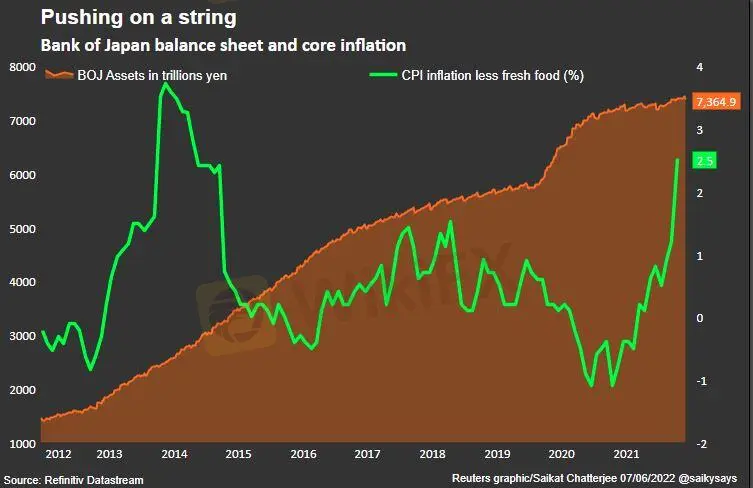简体中文
繁體中文
English
Pусский
日本語
ภาษาไทย
Tiếng Việt
Bahasa Indonesia
Español
हिन्दी
Filippiiniläinen
Français
Deutsch
Português
Türkçe
한국어
العربية
Marketmind: This is what it sounds like when doves cry
Abstract:Operation shock and awe: June 2022 will most likely be remembered as the month central banks finally decided to bring out the big guns to shoot down soaring inflation.

Within 48 hours, the U.S. Federal Reserve made its biggest rate hike since 1994, the Swiss National Bank raised its policy interest rate for the first time in 15 years and the European Central Bank announced fresh emergency tools to support the blocs indebted south while it tightens monetary policy.
The Bank of England also rose borrowing costs for the fifth time since December and its benchmark interest rates is now at its highest since January 2009 even as the economy lurches into recession.
With the glaring exception of the Bank of Japan which has steadfastly stuck to its ultra-dovish policy, the hawks of monetary policy are now clearly running the show globally.
A quick look at the state of financial markets gives a pretty clear idea of, as late musician Prince used to sing, what it sounds like when doves cry.
The yield of Germany‘s bund’s at one point yesterday surged by a whopping 20 basis point, the Swiss franc jumped a rare 2% against the euro and a multitude of equity indexes confirmed a bear market.
All in all world stocks are heading for their worst week since the March 2020 pandemic meltdown as investors worry about the economic consequences of fast-rising interest rates.
Speaking of which, the Philadelphia Federal Reserves manufacturing activity index got its first negative reading since the early months of the coronavirus pandemic and the outlook for the next six months was the lowest since February 2008.
Adding to the gloom, U.S. homebuilding fell to a 13-month low in May and permits tumbled, suggesting the housing market was cooling as surging mortgage rates reduce affordability for many first-time homebuyers.

Key developments that should provide more direction to markets on Friday:
– Shanghais economy shrinks again in May but at slower pace
– Britains Tesco reaffirms profit guidance despite sales fall
– Swedens Riksbank policy meeting
– U.S. industrial production
– Santander appoints Hector Grisi as new CEO

Disclaimer:
The views in this article only represent the author's personal views, and do not constitute investment advice on this platform. This platform does not guarantee the accuracy, completeness and timeliness of the information in the article, and will not be liable for any loss caused by the use of or reliance on the information in the article.
Read more

The Funded Trader: Reactivates Accounts with Revised Payout Structure
Proprietary trading firm The Funded Trader has detailed its financial recovery efforts following a turbulent period marked by an unsustainable payout model. Addressing these challenges publicly, the firm outlined the steps being taken to resolve outstanding obligations and ensure operational sustainability.

Doo Group Broadens Global Footprint with Indonesian Broker Acquisition
Doo Group has announced its acquisition of PT Prima Tangguharta Futures, a Jakarta-based broker specialising in online derivatives trading. This move represents a significant step in Doo Group's regional expansion strategy and reinforces its growing presence in Southeast Asia.

Why Is UK Inflation Rising Again Despite Recent Lows?
October inflation rises to 2.3%, driven by energy costs. Renters face 8% annual hikes, while house price inflation climbs. Interest rates stay elevated.

Webull Partners with Coinbase to Offer Crypto Futures
Webull partners with Coinbase Derivatives to offer crypto futures, providing US investors access to Bitcoin and Ethereum contracts with lower entry barriers.
WikiFX Broker
Latest News
Webull Partners with Coinbase to Offer Crypto Futures
eToro Expands Nationwide Access with New York Launch
GCash, Government to Launch GBonds for Easy Investments
Why Is UK Inflation Rising Again Despite Recent Lows?
Interactive Brokers Launches Tax-Friendly PEA Accounts in France
Find Regulated Brokers from A to Z on WikiFX
Countdown to WikiEXPO Dubai 2024 — “Seeing Diversity, Trading Safely”
Former Director Sentenced for Share Disclosure Breach
PayPal Expands PYUSD Use for Seamless Cross-Border Transfers
Trump Media in Talks to Acquire Crypto Firm Bakkt
Currency Calculator


